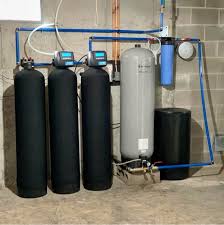Clean, safe water is a necessity for every home. While many homeowners rely on municipal water treatment, additional filtration can improve water quality, remove contaminants, and enhance taste. A whole house water filter is an effective solution for ensuring that all water entering a home is purified. Choosing the right system requires understanding different filtration technologies, flow rates, and maintenance requirements. This guide will help homeowners select the ideal whole house water filter for their needs.
Understanding Whole House Water Filters
A whole house water filter is designed to treat water at the point of entry, providing filtered water to every faucet, shower, and appliance. Unlike point-of-use filters, which only clean water at a single location, whole house systems ensure consistent water quality throughout the home. These systems remove sediment, chlorine, heavy metals, and other contaminants depending on the filter type. By treating water at the source, homeowners protect plumbing, appliances, and household members from the negative effects of hard water, chemicals, and impurities.
Identifying Water Quality Needs
Before selecting a whole house water filter, it is important to evaluate water quality. Testing the water for common contaminants such as sediment, chlorine, iron, lead, and bacteria provides valuable information for choosing the right system. Homes with private wells may require filtration for bacteria or high mineral content, while municipal water may need chlorine and chemical removal. Understanding water composition ensures that the selected filter addresses specific concerns and provides safe, high-quality water.
Filtration Types
There are several types of whole house water filter systems, each with unique capabilities. Sediment filters are designed to remove dirt, sand, and rust particles that can clog pipes and appliances. Carbon filters are effective at removing chlorine, chemicals, and unpleasant odors, improving water taste. Specialty filters, such as KDF or catalytic carbon, target heavy metals and control bacteria growth. Some systems combine multiple filter types to provide comprehensive treatment, offering a higher level of protection for the entire household.
Flow Rate Considerations
Flow rate is a critical factor when selecting a whole house water filter. The system must be capable of supplying enough water for all fixtures and appliances simultaneously without reducing pressure. Homes with multiple bathrooms and high water usage require filters with higher flow capacities. Manufacturers typically provide flow rate ratings in gallons per minute, which helps homeowners match the system to household water demands. Choosing a system with the correct flow rate ensures that water pressure remains consistent while filtration is effective.
Maintenance and Longevity
Maintaining a whole house water filter is essential for optimal performance. Filters need to be replaced or cleaned regularly according to the manufacturer’s guidelines. Some systems have indicator lights or pressure gauges that alert homeowners when maintenance is needed. Regular upkeep prevents clogs, maintains water quality, and extends the lifespan of the system. Considering ease of maintenance when selecting a filter system can save time and reduce long-term costs.
Installation and Professional Assistance
While some whole house water filter systems are suitable for DIY installation, many homeowners benefit from professional installation. Proper installation ensures correct placement, secure connections, and compliance with plumbing codes. Professionals can also help with selecting the right system size, flow rate, and filtration type based on water quality tests and household usage. Professional installation reduces the risk of leaks, pressure issues, and other complications.
Selecting the right whole house water filter involves evaluating water quality, filtration needs, flow rate, and maintenance requirements. A well-chosen system provides clean, safe water throughout the home, protecting plumbing, appliances, and family members. By considering water composition, filter type, and household water usage, homeowners can ensure they select a reliable system that delivers consistent, high-quality water. Investing in a whole house water filter is an effective way to enhance water safety, improve taste, and maintain the efficiency of home plumbing and appliances for years to come.






